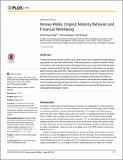Money Walks: Implicit Mobility Behavior and Financial Well-Being
Author(s)
Singh, Vivek Kumar; Bozkaya, Burcin; Pentland, Alex Paul
DownloadSingh-2015-Money Walks_ Implici.pdf (3.619Mb)
PUBLISHER_CC
Publisher with Creative Commons License
Creative Commons Attribution
Terms of use
Metadata
Show full item recordAbstract
Traditional financial decision systems (e.g. credit) had to rely on explicit individual traits like age, gender, job type, and marital status, while being oblivious to spatio-temporal mobility or the habits of the individual involved. Emerging trends in geo-aware and mobile payment systems, and the resulting “big data,” present an opportunity to study human consumption patterns across space and time. Taking inspiration from animal behavior studies that have reported significant interconnections between animal spatio-temporal “foraging” behavior and their life outcomes, we analyzed a corpus of hundreds of thousands of human economic transactions and found that financial outcomes for individuals are intricately linked with their spatio-temporal traits like exploration, engagement, and elasticity. Such features yield models that are 30% to 49% better at predicting future financial difficulties than the comparable demographic models.
Date issued
2015-08Department
Massachusetts Institute of Technology. Media Laboratory; Program in Media Arts and Sciences (Massachusetts Institute of Technology)Journal
PLOS ONE
Publisher
Public Library of Science
Citation
Singh, Vivek Kumar, Burcin Bozkaya, and Alex Pentland. “Money Walks: Implicit Mobility Behavior and Financial Well-Being.” Edited by Renaud Lambiotte. PLOS ONE 10, no. 8 (August 28, 2015): e0136628.
Version: Final published version
ISSN
1932-6203